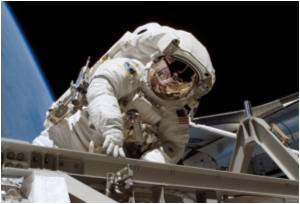Space travel could boost the risk of colon cancer, finds study.

A second study by the same group of researchers suggests that cosmic radiation prevents gut cells from destroying a protein called beta-catenin, which in turn, promotes uncontrolled cell growth.
In space, astronauts are exposed to levels of radiation that, on Earth, have previously been shown to increase the risk of getting cancer but exactly how much the cancer risk might increase after a trip to space is not known, Fox News reported.
By studying mice, the researchers hope to develop a better estimate of the risk, as well as strategies that could protect space travellers, the researchers said.
Study researcher Dr. Kamal Datta, of the Georgetown Lombardi Comprehensive Cancer Center in Washington, DC said that sustained exposure during prolonged space missions, like a mission to Mars, and lengthy stays at the International Space Station may cause significant cosmic radiation dose accumulation in astronauts, and thus remains a long-term health concern of space exploration.
Study researcher Shubhankar Suman, also of Georgetown University, said that knowing how space radiation induces tumour formation will allow them to develop preventive strategies that target this specific signalling pathway.
Advertisement
Source-ANI















